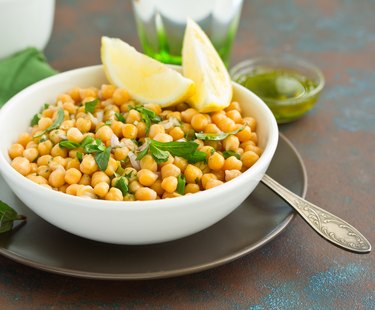
What are amino acids? In a nutshell, protein. More specifically, as the U.S. National Library of Medicine (NLM) explains, amino acids are organic compounds that come together to form proteins. And, as such, they are the essential "building blocks of life."
According to the Harvard T.H. Chan School of Public Health (HSPH), amino acids are found in your muscle, hair, skin and bones, enabling your body to grow, repair body tissue and break down food. They're also a key source of energy. In fact, Harvard experts point out that enzymes composed of amino acids are critical for a host of chemical interactions throughout the body, as well as the body's ability to receive oxygen.
Video of the Day
Video of the Day
You Are What You Eat
The hitch? The human body can only produce some non-essential amino acids. Those include alanine, arginine, asparagine, aspartic acid, cysteine, glutamic acid, glutamine, glycine, proline, serine and tyrosine, according to the NLM.
No such luck when it comes to the "essential" variety, of which there are nine. So, if you want to maintain sufficient amounts of histidine, isoleucine, leucine, lysine, methionine, phenylalanine, threonine, tryptophan and valine, there's really just one way to do it: Eat!
The good news is that animal and plant proteins both contain roughly 20 common amino acids, according to the U.S. National Academy of Sciences. Your job is simply to ensure that your diet includes enough amino-acid-rich foods to maintain optimal health.
Protein Recommendations
So how much is enough? HSPH researchers point to U.S. National Academy of Medicine (NAM) recommendations, which suggest that adults consume at least 7 grams of protein for every 20 pounds of body weight.
That's about 50 grams of essential amino-acid-rich protein for someone who weighs 140 pounds, and about 70 grams for someone around 200 pounds. NAM recommendations also advise that protein account for 10 to 35 percent of your total caloric intake.
Up Protein Intake, Not Fat
The catch is that while certain foods, such as red meat, may pack a lot of essential amino acids, they also pack a lot of fat. Take, for example, a 4-ounce broiled sirloin. According to HSPH, that serving would contain 33 grams of protein and 5 grams of saturated fat.
That's a lot of fat. And with Americans in the throes of an exploding obesity epidemic, fat is definitely not your friend. Particularly saturated fat, which can clog arteries, drive up blood pressure and lead to heart disease.
The upshot is that everyone needs the amino acids; the fat, no so much. But they often come hand-in-hand. What to do?
Are Supplements the Answer?
Enter "branched-chain amino acid" (BCAA) supplements. Such supplements contain three of the essential amino acids — leucine, isoleucine and valine, says the National Institutes of Health's Office of Dietary Supplements. What they don't have? Fat.
And that begs the question: Could taking BCAA supplements be a clever, fat-free way to get the amino acids/protein you need without driving up blood pressure and jeopardizing heart health? Might they even lower blood pressure?
Unfortunately, the jury remains out on those questions.
"There are some studies regarding branched-chain amino acids intake and associations with blood pressure," notes Gregg Fonarow, MD, director of the Ahmanson-University of California Los Angeles Cardiomyopathy Center. "But there are no high-quality studies or guidelines which support the use of these as a supplement."
Michael J. Blaha, MD, MPH, director of clinical research at the Johns Hopkins Ciccarone Center for the Prevention of Heart Disease, in Baltimore, echoes that lament. "There are no high-quality studies of their benefit," he says, regarding BACC supplements and blood pressure control, "so I do not recommend them to patients at this time."
But supplements aside, there is a way to get the needed amino acids through food without undermining blood pressure or heart health — and that's plants.
Plant Protein Is Your Friend
According to the Mayo Clinic, the typical American diet is already chock-full of protein. So, consider setting aside fatty meats in favor of a more plant-based approach.
Reaching for beans, peas, soy products like tofu, unsalted nuts, seeds, eggs and low-fat milk could be a great way to get all the amino acids you need without risking your cardiovascular health.
- Gregg Fonarow, MD, director, Ahmanson-University of California Los Angeles Cardiomyopathy Center
- Michael J. Blaha, MD, MPH, director of clinical research, Johns Hopkins Ciccarone Center for the Prevention of Heart Disease, Baltimore
- U.S. National Library of Medicine: "Amino Acids"
- U.S. National Academy of Sciences: "Recommended Dietary Allowances: 10th Edition"
- Harvard School of Public Health: "Protein"
- Mayo Clinic: "Nutrition and Healthy Eating"
- Office of Dietary Supplements, National Institutes of Health: "Dietary Supplements for Exercise and Athletic Performance"
Is this an emergency? If you are experiencing serious medical symptoms, please see the National Library of Medicine’s list of signs you need emergency medical attention or call 911.